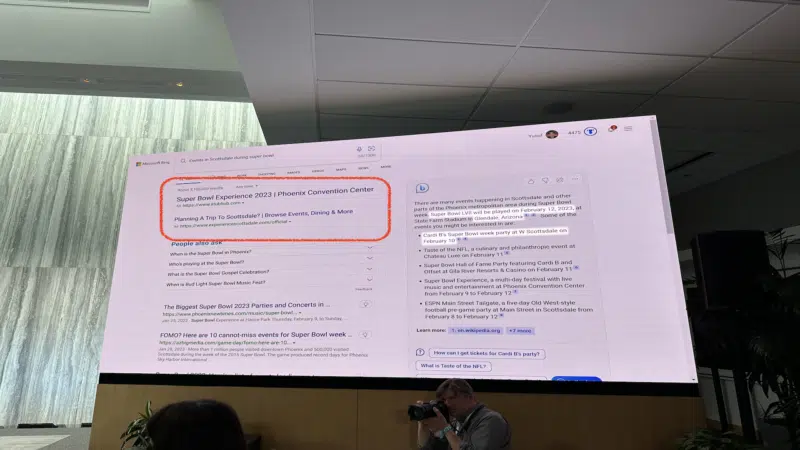Will the new Bing create more opportunities for advertisers? Maybe
The placement of ad results won't change right now, but there could be an opportunity in the future to incorporate them into the AI results.
Today, Barry Schwartz and I had the great honor of being there live at the Microsoft Executive Briefing Center, or Building 33, for those in the know, for the announcement of their new Bing and Edge AI-powered search results experience.
By leveraging the power of OpenAI, Microsoft will allow users to chat with, ask questions, or even use it to create content.
But how will this affect advertisers?
Ask and you shall receive. But not really. I asked that very questions during the Q&A portion of the presentation. I was told that ads were already incorporated and they were visible in one of the screenshots in the presentation.

In a brief statement, Microsoft said
“And as usage expands, we expect to see greater volume leading to more opportunities for advertisers to reach their desired customers.”
Rob Wilk, CORPORATE VICE PRESIDENT, MICROSOFT ADVERTISING
But come to find out, this is not the result they were referring to. In fact, when you receive an answer to a query such as “who are the best dentists in Seattle?” You get a list of dentists with descriptions of their office, address, and (sometimes) Yelp ratings. But you’ll need to hover over the results to see relevant ads, as well as any ad for that specific result.
I don’t have proof of this, as I had to approach a staff member after the keynote to ask about new ad opportunities. But once the new Bing search experience is released to the public, I’ll update this article.
What’s new. As of right now, it looks like relevant ads will remain on the left side of the page, while the AI answers are on the right. In some cases, you can see relevant ads directly within the AI result when you hover over the answers.
Why we care. With all of the chatter (pun intended) around AI, there’s a lot up in the air right now. As usage expands, ChatGPT’s natural language processing capabilities will get better matching queries with advertisements in a more intuitive way, leading to increased ad visibility and improved targeting. This can result in a better return on investment for advertisers who utilize the Bing platform.
Alternatively, informational results could hurt advertisers if users aren’t incentivized to click an ad for the information they seek.
Contributing authors are invited to create content for Search Engine Land and are chosen for their expertise and contribution to the search community. Our contributors work under the oversight of the editorial staff and contributions are checked for quality and relevance to our readers. Search Engine Land is owned by Semrush. Contributor was not asked to make any direct or indirect mentions of Semrush. The opinions they express are their own.


